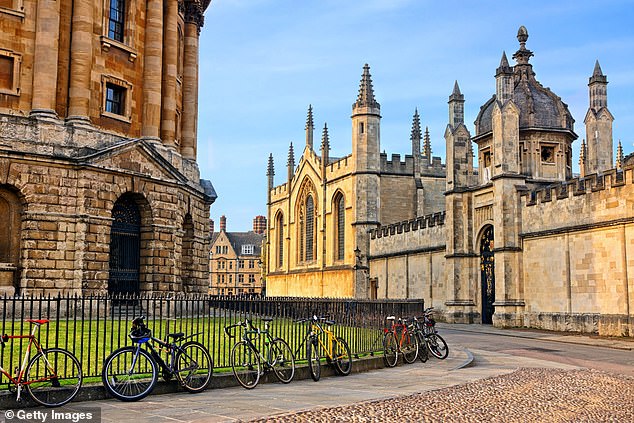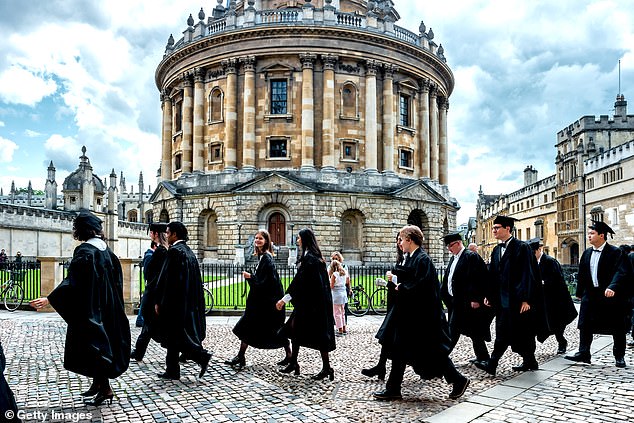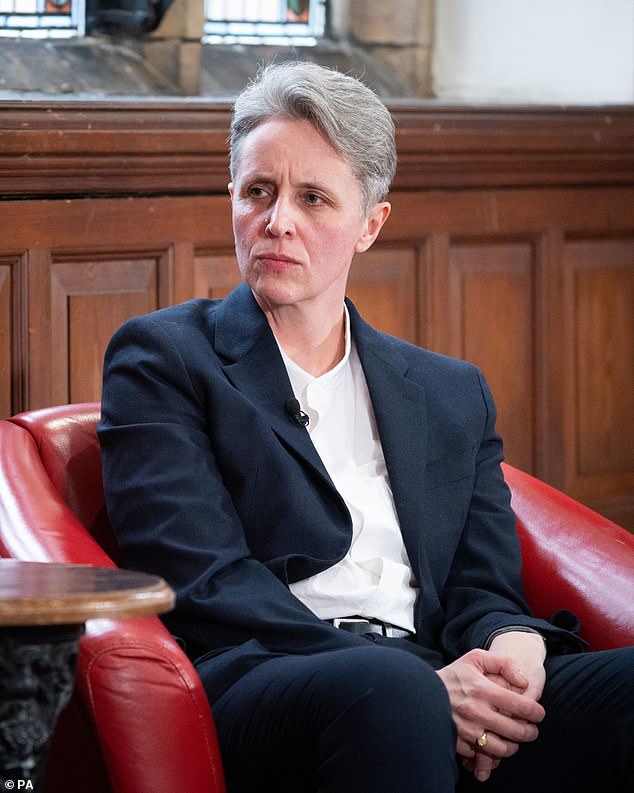Oxford, Cambridge and more than 50 other UK universities have tumbled down the global rankings amid funding and free speech crises.
The respected Quacquarelli Symonds (QS) World University Rankings demoted the majority of our institutions, saying they are not improving as fast as those in other countries.
It comes as a poll found a fifth of academics around the country said they did not feel ‘free’ to discuss controversial topics such as gender.
Of the 90 UK universities ranked in the survey, published today, 54 institutions — 61 per cent – slipped down, while only 24 improved and 11 stayed the same.
Oxford slipped from third place to fourth in the world, while Cambridge slipped from fifth to sixth.
World-renowned science university Imperial College London retained its second place, while US university Massachusetts Institute of Technology was first.
It comes as many UK universities grapple with financial problems due to a drop in lucrative international students following visa rule changes.
In addition, many are having to dedicate time and resources to dealing with free speech controversies and student protests.

Oxford (pictured), Cambridge and more than 50 other UK universities have tumbled down the global rankings amid funding and free speech crises
The rankings are based on a range of metrics including research, employment outcomes and academic reputation.
Jessica Turner, chief executive of QS, said that while some UK universities had improved their scores, ‘the picture for the wider country as a whole is more worrying’.
She said: ‘The UK has until now been one of the countries to dominate QS World University Rankings, but institutions in the country are facing heightened competition internationally.
‘Universities across the country will need more support to ensure their stability going ahead.
‘Global competitors are seeing their governments increase investment in higher education and research, leading to international peers gaining and, in many cases, overtaking UK universities.’
A total of 17 of the UK universities included feature among the top 100.
However, the QS researchers said that ‘universities worldwide are improving at a faster pace than their UK counterparts’.
Others slipping down included Edinburgh, Manchester, the London School of Economics, Warwick, Glasgow, Leeds, Southampton and Durham.
Seven of Ireland’s eight ranked universities improved this year, as did nine out of 13 universities in the Netherlands, and six of Hong Kong’s seven.

The respected Quacquarelli Symonds (QS) World University Rankings demoted the majority of our institutions, saying they are not improving as fast as those in other countries (pictured: Oxford students)

Vivienne Stern (pictured), chief executive of Universities UK, said: ‘This decline isn’t inevitable’
The QS rankings evaluates more than 1,500 institutions across 106 countries and territories.
Its authors said UK universities face further problems due to Government plans to slash capital funding in higher education, introduce an international student levy and shorten the length of the graduate visa route to 18 months from two years.
They said: ‘This could accumulate in a negative impact on the quality and breadth of higher education courses and research undertaken across the country.’
A recent report by the Office for Students showed 43 per cent of universities face a deficit in 2024/25.
Vivienne Stern, chief executive of Universities UK, said: ‘The UK’s universities are world leading, and continue to punch above their weight in global league tables and research partnerships.
‘But other governments around the world are making the decision to invest in their universities at a time when our government is being slow to do so.
‘This decline isn’t inevitable.
‘Universities are already working extensively to transform their work in the face of funding pressures, and, with a commitment from government to a long-term and lasting funding settlement, this slight downturn can be reversed.’
A spokesman for the Department for Education said: ‘This government inherited a sector facing serious financial risk and has taken tough decisions to fix the foundations of higher education to deliver change for students and staff.
‘Universities are independent from government, but we remain committed to boosting the sector’s long-term financial sustainability, through our Plan for Change and restoring universities as engines of opportunity, aspiration and growth.
‘The government has refocused the efforts of the Office for Students on monitoring financial sustainability, to help create a secure future for our world-leading sector.’
Fifth of academics feel restricted on topics such as gender
One in five academics do not feel ‘free’ to teach heated topics like gender as they fear being cancelled, a new poll shows.
A survey by the Office for Students (OfS) found 21 per cent feel restricted in discussing challenging topics in lectures.
Sex and gender was the most troublesome topic, with 63 per cent saying they were not free to discuss it, while more than 50 per cent said this of race, religion and immigration.
One in 20 of those polled said they were afraid of physical attacks if they included controversial topics in their teaching.
The weighted poll of 1,200 academics was released alongside new guidance telling universities to stop cancelling gender-critical events and avoid blanket bans on ‘misgendering’.
Arif Ahmed, director of freedom of speech at the OfS said: ‘The results of this poll are deeply disturbing, and show that a sizeable minority of academics from across the political spectrum do not feel free to teach, research or discuss controversial topics.
‘This cannot stand, and should concern vice-chancellors up and down the country.’
The OfS guidance, released today, aims to help universities prepare to comply with the Higher Education (Freedom of Speech) Bill, which comes into effect in August.

It comes as a poll found a fifth of academics said they did not feel ‘free’ to discuss controversial topics such as gender (pictured: Professor Kathleen Stock)
The bill, introduced in 2023 under the Tories, has been watered down by Labour so that universities cannot be sued by individuals.
However, the guidance places heavy duties on universities, including taking action against foreign states accused of using their influence to enable censorship of debate – such a China.
It says universities must ‘amend or terminate’ agreements with such countries.
In addition, it says students and staff should not be ‘punished’ for expressing a lawful viewpoint, including one critical of the institution.
And universities must no longer require applicants for academic jobs or promotions to show commitment to a viewpoint.
It also says if a university cancels a professor’s seminar about gender-critical views because of student protests, it is likely to be in breach of the law.
And any blanket ban on ‘misgendering’ transgender people is likely to be in breach too.
It comes after dozens of professors have spoken of how their universities turned against them due to their political views.
Last year, Professor Jo Phoenix won a constructive dismissal claim against the Open University, which ‘told her off’ and ‘discriminated’ against her due to her gender-critical beliefs.
This year, the University of Sussex was fined £585,000 for failing for uphold free speech for Professor Kathleen Stock, who was hounded out of her job by transgender activists.












